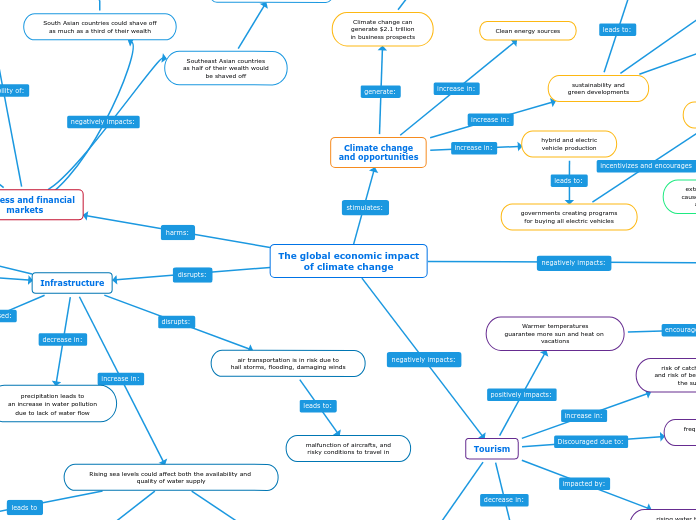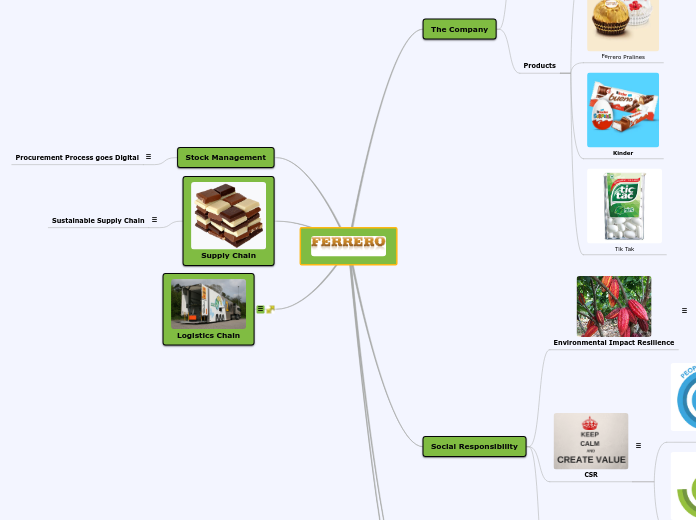Climate change
and opportunities
hybrid and electric
vehicle production
governments creating programs
for buying all electric vehicles
sustainable
transportation
sustainability and
green developments
pharmaceutical companies
developing drugs that help
combat illnesses that humans
are more prone to due to climate
change (malaria, dengue, etc.)
Biotech companies putting
in efforts to create crops that
are resistant to extreme weather
conditions
demand for weather monitoring
equipment due to extreme weather
construction of green infrastructure
and coastal infrastructure
New jobs in specific sector
Clean energy sources
Climate change can
generate $2.1 trillion
in business prospects
Arctic ice melting
prospects for oil
and gas drilling
all these new business prospects
are ultimately still contributing to
climate change
New shipping transportation routes
transportation times
Business and financial
markets
drought can make water
more expensive
Cost of production and
extraction of raw materials
The frequency and intensity of
extreme weather and weath conditions
will affect the bottom line of businesses and corporations
Climate volatility
Higher air/water temperatures
can lead to asset corrosion
uncertainty in prices of resources for production, energy, transportation
and insurance
the infrastructure of businesses
factories, supply chain
functions, transportation
Southeast Asian countries
as half of their wealth would
be shaved off
Philippines, Malaysia, Thailand
economy would shrink by 40%
South Asian countries could shave off
as much as a third of their wealth
India
economy would shrink by 35%
Global economic output
by 11%-14% by 2050
due to climate change
Products may become
obsolete or lose their
market
$23 trillion
Tourism
Warmer temperatures
guarantee more sun and heat on
vacations
tourism
risk of catching diseases
and risk of being harmed by
the suns rays
rising sea levels
put coastal regions
and small islands
at risk
frequent and harsher
wildfires
rising water temperatures
can stimulate algae growth and
compromise water quality
water to become compromised
as a resource due to euthrophication
Water
recreation activities
winter tourism revenue,
losing nearly $2 billion
annually in 2030
less snowfall and shorter
and less cold seasons
Infrastructure
air transportation is in risk due to
hail storms, flooding, damaging winds
malfunction of aircrafts, and
risky conditions to travel in
Rising sea levels could affect both the availability and quality of water supply
precipitation leads to
an increase in water pollution
due to lack of water flow
precipitation leads to
damaged infrastructure due to
flooding
global communication networks
will be affected due to flooding and
rising sea levels
fibre optics cables, data centres,
traffic exchanges, and termination
points
Military bases are in
a vulnerable position
due to flooding and
rising sea levels
Extreme weather will lead to
the need to repair and maintain
infrastructures
An increase in
maintenance costs
Agriculture
crop yield
inflation in prices
for commoditites
businesses as their costs
for raw materials will increase
vulnerability in farmers,
increase in need to adapt
to changing conditions
fire risk
increase in pests and weeds
decrease in availability
of water and groundwater
heat and drought
A reduction in
crop yield
for every degree celsius the
global thermostat increase,
there will be a 5-15% decrease
in overall agricultural output
extreme rainfall and flooding
cause fields to be washed away
and livestock to drown
Farmers to plant less crops
compared to previously
Yield will cause prices for things
such as animal feed and ethanol to
inflate
In March of 2019, the American
state of Iowa lost $1.6 billion worth
of crops and livestock
food supply insecurity
The global economic impact
of climate change









